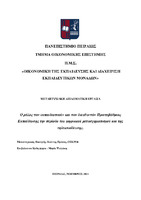Ο ρόλος των εκπαιδευτικών και των διευθυντών πρωτοβάθμιας εκπαίδευσης την περίοδο του ψηφιακού μετασχηματισμού και της τηλεκπαίδευσης

Προβολή/
Λέξεις κλειδιά
Ηγεσία ; Αναστολή λειτουργίας σχολικών μονάδων ; Εξ αποστάσεως εκπαίδευση ; Ρόλος εκπαιδευτικών ; Ρόλος σχολικού ηγέτηΠερίληψη
Η πανδημία του νέου κορονοϊού COVID-19 έκανε την εμφάνισή της σε ανύποπτο χρόνο και επέδρασε στην κοινωνία με τέτοιο τρόπο που άλλαξε πολλά στην εκπαίδευση, στην καθημερινότητα και στις ζωές των ανθρώπων σε όλο τον κόσμο. Η αναστολή της λειτουργίας όλων των εκπαιδευτικών μονάδων ήταν ένα από τα πολλά αναγκαία μέτρα ώστε να διασφαλιστεί η υγεία όλων των εμπλεκόμενων. Η χρήση των νέων τεχνολογιών έδωσε στους εκπαιδευτικούς όλων των βαθμίδων τα εργαλεία εκείνα ώστε να μπορέσουν να συνεχίσουν να διδάσκουν από απόσταση. Η κρίσιμη κατάσταση που δημιουργήθηκε εξ αιτίας της πανδημίας έθεσε τους στόχους της Εκπαίδευσης σε νέο προσδιορισμό μεταλλάσσοντας το εκπαιδευτικό σύστημα σε ένα σύστημα ώστε να αδράξει την ευκαιρία που του δίνεται από τις νέες τεχνολογίες και να τις χρησιμοποιήσει με τέτοιο τρόπο μεγιστοποιώντας την δυνατότητα συνέχισης στη μάθηση παρά τα εμπόδια που έφερε η αναστολή φοίτησης των μαθητών στους εκπαιδευτικούς οργανισμούς. Αν και οι υπηρεσίες του Υπουργείου Παιδείας έκαναν προσπάθειες να ανταποκριθούν αποτελεσματικά στη νέα κρίσιμη κατάσταση με στόχο να ενσωματωθούν ομαλά οι νέες τεχνολογίες στην Εκπαιδευτική διαδικασία, έπρεπε να ξεπεραστούν πολλά και μεγάλα εμπόδια άμεσα και σύντομα. Αν και οι εκπαιδευτικοί έκαναν μεγάλη προσπάθεια για να ανταπεξέλθουν στις νέες ανάγκες των μαθητών, χρειάστηκαν να αναζητήσουν τρόπους για να μπορέσουν να κατανοήσουν το νέο ψηφιακό περιβάλλον στο οποίο έπρεπε να δράσουν. Όμοια οι διευθυντές έπρεπε να εργαστούν ώστε να δημιουργηθεί ένα κλίμα δυνατοτήτων στο οποίο οι εκπαιδευτικοί θα είχαν την δυνατότητα να αναμετρηθούν με την κρίση και να ανταποκριθούν στην νέα πρόκληση.
Η εργασία αυτή περιγράφει αρχικά την κατάσταση κρίσης που δημιούργησε η πανδημία και το χρονικό αναστολής των σχολικών μονάδων όπως διαμορφώθηκε μέσα από δύο διαφορετικές περιόδους. Καταγράφει τις ανάγκες εκείνες που οδήγησαν στην εξ αποστάσεως εκπαίδευση, τις δυνατότητες που δόθηκαν στους εκπαιδευτικούς να αξιοποιήσουν ψηφιακά εργαλεία για να μπορέσουν να εργαστούν από απόσταση αλλά και τα εμπόδια που έπρεπε να αντιμετωπιστούν και να ξεπεραστούν τόσο θεσμικά όσο και σε επίπεδο σχολικών οργανισμών. Στη συνέχεια ερευνά τις απόψεις των εκπαιδευτικών Πρωτοβάθμιας Εκπαίδευσης για το νέο ρόλο που ανέλαβαν μέσα από τις συνθήκες που διαμορφώθηκαν σε σχέση κυρίως με τη χρήση των ψηφιακών εργαλείων και για τον νέο ηγετικό ρόλο των διευθυντών τους σε σχέση με την ψηφιοποίηση των τάξεων του σχολικού οργανισμού.


